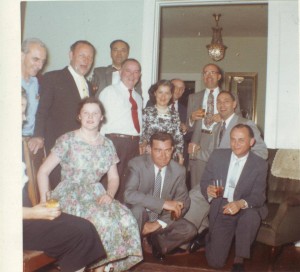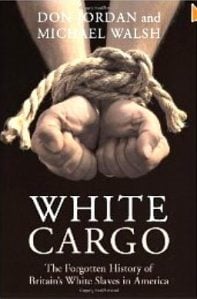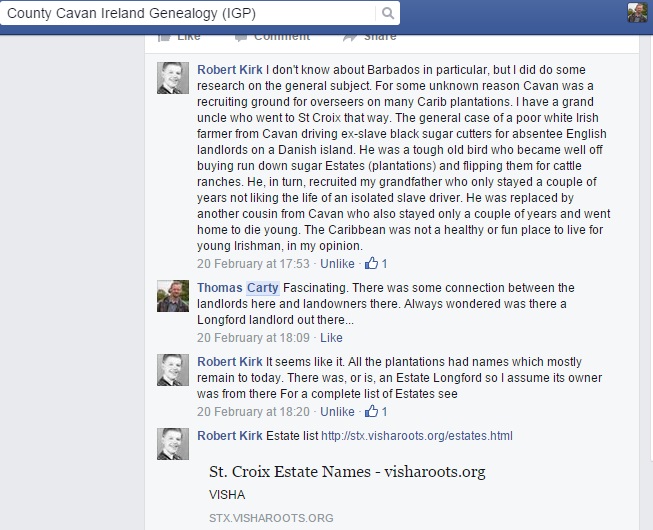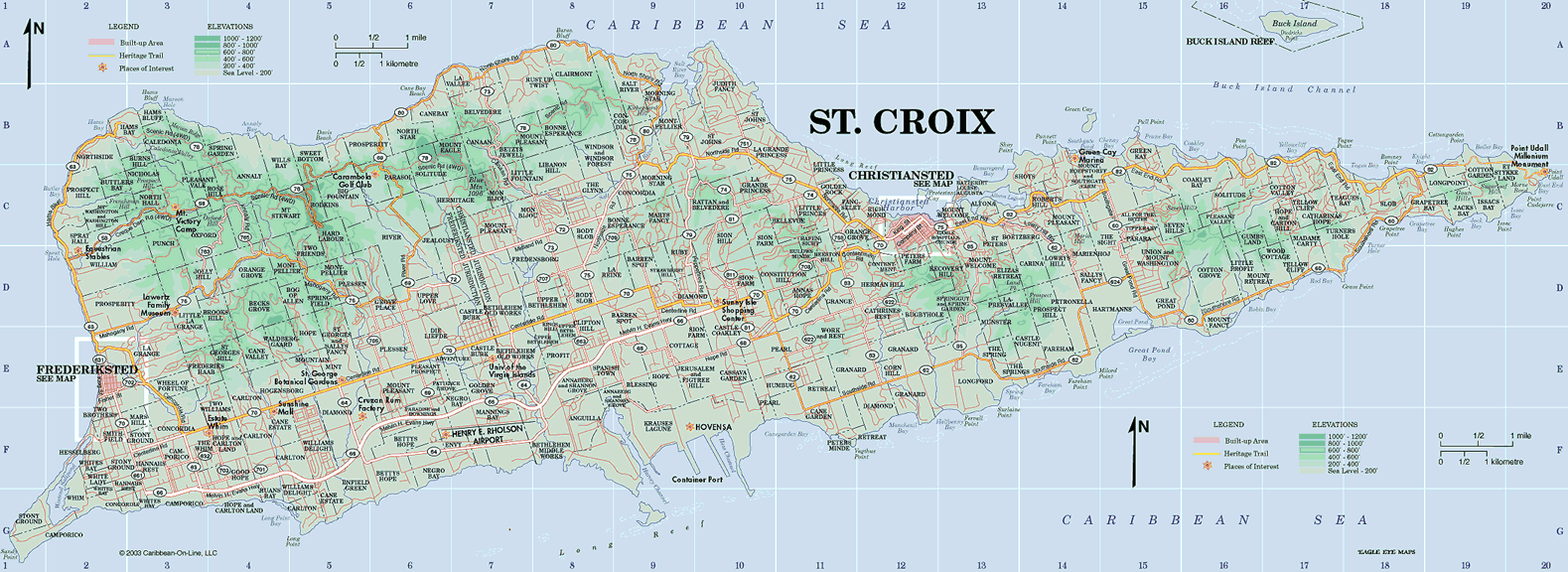Blaggards and Blackguards, Slavery, Civil Rights, the Irish and the Longford Connection
When I was a child, I collected stamps. Sad, I know, but I loved it. One of the counties I got stamps from was Montserrat, the emerald isle of the carribean. A kind worded letter states I could be one of them, Carty being a very common name there, with that spelling (no Mac/Mc, and no H in the surname).
I said it to my mother who was bemused, but she told of an ancestor of her grandmother who was a plantation agent, but in Barbados, and her grandmother had a chest belonging to him, and where it went after her death, she never knew.
This fired my childish imagination, dreaming of pirate chests and treasure from the Caribbean, not knowing the pain and suffering beings such an agent – literally a slave driver – brought to the slaves.

She was very active on the civil rights marches in the late 1950’s and early 1960’s, the only white in her workplace so to be. She was very close to the African American workers in the kitchen, who laughed at her for wanting to be involved. I never understood myself, until the reality of what a plantation agent was. It was probably guilt for what her family had done – even if only one – during his time wroking in the slave trade.
She used to tell of one chef who jokes about her sun bathing: “You whites look down on us blacks for being black… you are white: you then lie in the sun to become black! You are crazy!”. She used to tell of a bigoted bus driver who when being told what stop she wanted to get off at was sneered “You want to get off where all the blacks go”. Bar, he used the N word.
After her death, and more particularily after the house fire I suffered in 2014, I set to research the family history, the good, the bad and the ugly. This chap was the ugly: all I knew was the townland he was from, Ballinulty, his surname, Drake and that he was a slave driver, or black guard, politley known as a plantation agent.
Some may remember the trouble Mary O’ Rourke got into for using the term “blackguard / blaggard” about someone, it being alleged it was racist. She apologised, but should not have had to. Its reminding us of the horrific part some Irish had in the slave trade.
We all know there was Irish slaves. Some call them indentured labourers. Some know, some of these when freed became slave owners themselves. And it winds black rights activists up the walls when Irish say “We once were slaves too”, the activists saying their is a big difference between indentured labour and slavery.
In indentured labour, you agreed to work for free to pay for your passage and land. It was a sort of serfdom. You were not in chains, and while not free to leave until your term was up, you could not be bought and sold, unlike slaves. It was a state you entered of your own free will, and was the way most Irish Americans, German Americans and Dutch Americans in particular made their start in the New World.
Black activists deny Irish were slaves, in good faith. They however are wrong, and they are right.
Our Friend Cromwell, and the Foundation of Jamaica
To hell or to Connaught!”
Everyone knows of the Cromwellian conquest, the Puritan laws of the Commonwealth, the beheading of the King, the sack of Drogheda and the casting to Connaught of the conquered who were not killed.
Its not the first conquest where the loser got Connaught as the reserved share, indeed thats how it got its name “Conns Portion”, and it was an allusion to that that is was uttered in the first place, probably. What we learned in school was Cromwell tool all of Leinster, Munster and Ulster, and cast the Gaelic Irish to Connaught, in revenge for the excesses of the 1641 Rebellion – in which an alleged direct ancestor of mine Myles “The Slasher” O’ Reilly lost his head at The Bridge of Finea.
Truth is, he never conquered south Munster, bar Cork and Waterford cities – Drakes in Cork and Waterford are descendants of his soldiers, and not directly descended from the Drakes of Meath / Cavan / Longford and Dublin.
He got quote a bit of trouble from the natives – unsuprisingly – and to pacify the region he gave the area as a personal colony to the City of Bristol (which already had Dublin as its personal colony). Bristol was a major slave port. Of white slaves. They had the right to take slaves from south Wales, Cornwall, and now Southern Munster.
His sailors founded a colony in Jamaica, and the first slaves to work the sugar there were Irish. Not indentures labourers, but slaves. In chains, taken by force, against their will from their homeland.
This is what the Irish know and most black rights activists don’t know.
But even he was not the first to sell Irish as slaves, according to scholars, that honour going to Charles I father James I, son of Mary Queen of Scots, who sold political rivals in 1625.
John Martin writes:
“The Irish slave trade began when James II sold 30,000 Irish prisoners as slaves to the New World. His Proclamation of 1625 required Irish political prisoners be sent overseas and sold to English settlers in the West Indies. By the mid 1600s, the Irish were the main slaves sold to Antigua and Montserrat. At that time, 70 percent of the total population of Montserrat were Irish slaves.”
When the Portuguese sold black African slaves to the English after buying them from the Arabs who bought them from the Empire of Mali (the slaves being of Mali’s newly conquered areas and tribes and political enemies) there was a sensation in England, and a crisis of conscience.
Should white people be slaves? The consensus was no, and all were freed.
Some of which promptly became owners themselves.
It was after this Irish going over to the Caribbean became indentured labourers, and not slaves. The bit the black activists know about, and most Irish.
 Working conditions were fierce. Allegedly, according to some books, “White Cargo” being one, the blacks were treated better though were slaves, as they could be sold for money, and if overworked could be lost as value, as an asset. The Irish could not be sold, so were abused and used and often worked literally to the death.
Working conditions were fierce. Allegedly, according to some books, “White Cargo” being one, the blacks were treated better though were slaves, as they could be sold for money, and if overworked could be lost as value, as an asset. The Irish could not be sold, so were abused and used and often worked literally to the death.
The truth in this I do not know, but it is highly plausible.
Tracking down the Embarrassing Relation
So, I went to track down this embarrassing relation, source of the story of the mysterius chest, about which I wrote in the verse Barbados Chest in a Molly Cottage
Emails to the papers in Barbados came to zilch, as did to the governement there. Cant blame them really. Then I posted the verse and a summary of the story on some genealogy boards on Facebook, and on one for Cavan (Ballinulty is on the Cavan border) I got a reply from a chap by the surname of Kirk…

The list of estates is here >>> http://stx.visharoots.org/estates.html
Summary
I was, and I am, stunned.

Granard and Longford are on the south coast, Madame Cartys is on the east coast. Cartys point is there too.
I browsed a few websites, and on VI FAMILIES I found one family, of Anglicans, but cannot figure out are they black or white, and if black, are they related to or just took the name of a white family.
Ive sent more emails, and am hoping to get more answers.
When we find the extent of involvement in the slave trade, I will be campaigning for an official apology issued from our governement. Its not just a Longford thing: theres a MUNSTER and a few other Irish names. Though we may not be directly responsible today, its still good we apologise as a nation, to wherever in the planet any of our folk were involved in the slave trade, either Gaelic Irish, Anglo Irish or Scots Irish.